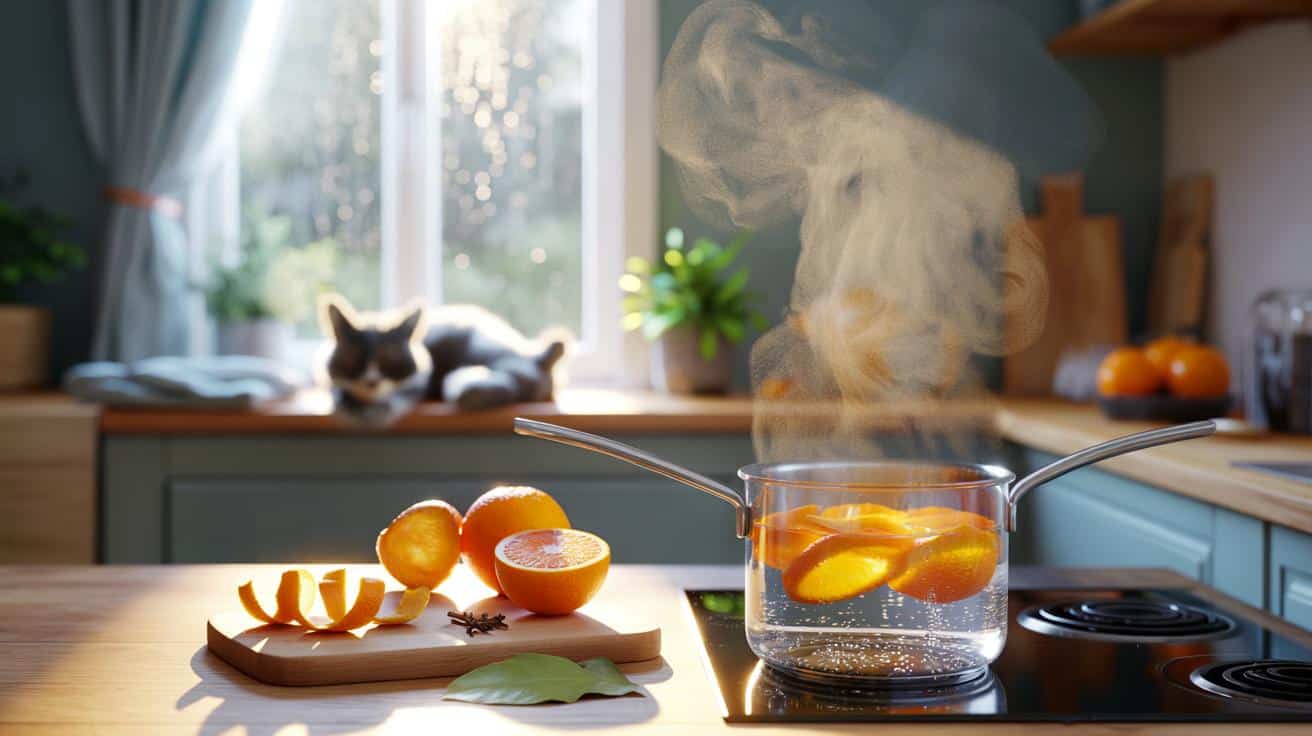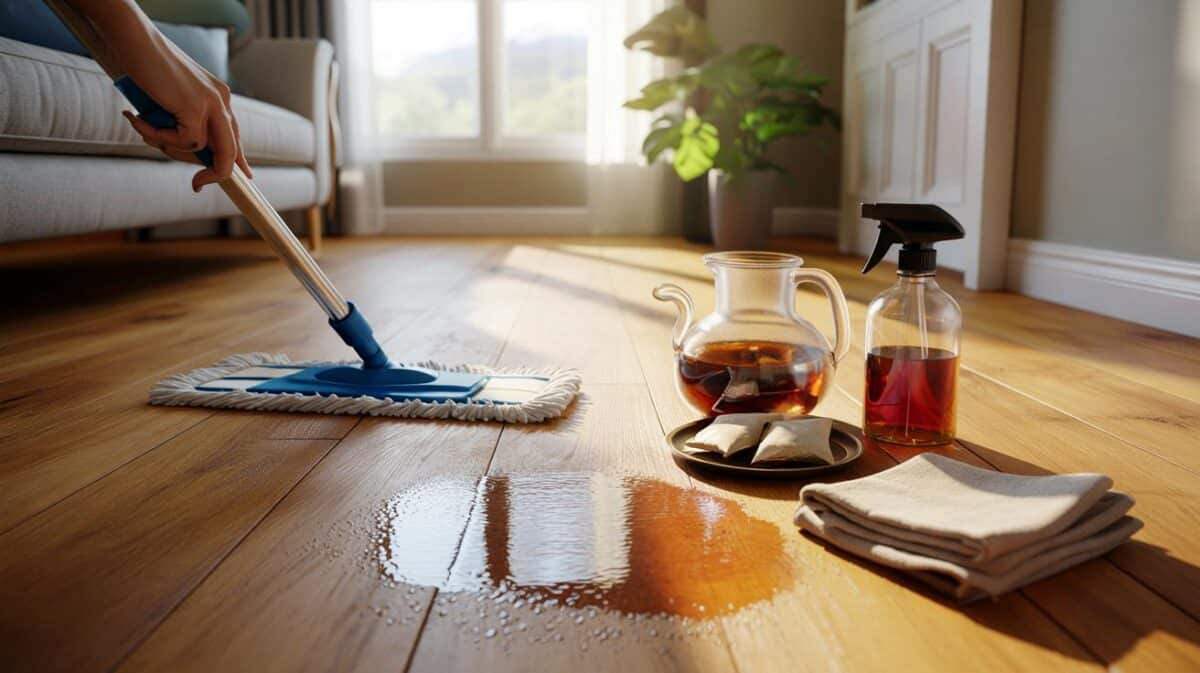The air inside our homes often sits heavier than we think — a quiet mix of cooking fumes, cleaning sprays, and street grit that drifts in on coats. When the windows stay shut and the candles do the heavy lifting, small, simple fixes start to feel like magic.
The kitchen was grey with January light; the windows were smudged with rain. When the water began to burble, a soft citrus cloud lifted, like a mood change. The cat sniffed the air, disdainful at first, then settled. I stood there, spoon in hand, smelling something bright but not perfumey — a clean that didn’t shout.
For a second, I could swear the room felt calmer. A quiet hack, hiding in plain sight. What if that citrus steam was doing more than smelling nice? What if it was quietly scrubbing the room?
The curious power of a humble peel
Scientists looking at everyday air have stumbled on a gentle surprise: **boiling orange peel** releases antioxidant vapour that can mop up some of the nasties that linger indoors. It sounds folksy, but the chemistry isn’t. Heat coaxes out fragrant citrus oils and plant polyphenols, and those compounds are reactive in a helpful way. In lab settings, they latch onto aggressive oxidants — the reactive molecules that make indoor air feel harsh — and neutralise them. Not a miracle. Just kitchen chemistry with good manners.
A tiny illustration lives in the kind of flat you’ve probably visited. One bedroom, a small galley kitchen, radiators hissing like old snakes. The couple who live there tried a weekend ritual: peels from two oranges, one litre of water, a gentle simmer while they read the papers. The room stopped smelling “closed”. Their cheap VOC badge — the kind that changes colour with higher levels — stayed a shade lighter during the hour the pot steamed. It’s not hard science, but it is a human-sized signal, and those often matter most.
What’s going on under the lid? Orange peel is famous among chemists for its limonene-rich oil, alongside flavonoids like hesperidin. Warm them and tiny amounts drift into the air with the steam. Those antioxidants are good at scavenging reactive oxygen species, the kind that come from cooking, cleaning sprays, or even outdoor pollution that sneaks in. They can also react with indoor ozone, blunting the sharp edge of that irritant. There’s a wrinkle: if you flood a room with strong citrus vapours, you can create other by-products. So the trick is low and slow, with fresh air tickling the room.
How to try it safely at home
Save the peel from two to three oranges. Rinse, shake dry, then tear into thumb-sized strips. Drop them into a small pot with about a litre of water. Bring to a light simmer, lid tilted so the vapour can wander. Let it whisper away for 15–30 minutes, topping up water if it dips. Crack a window a finger-width if you can. That’s it — no gadgets, just steam and citrus. For a softer scent, add a bay leaf. For more bite, a clove. Keep it simple the first time, feel the room, then tweak.
We’ve all had that moment when the house smells a bit stale and we reach for a spray. Here’s a quieter move. Go easy on the peel: more isn’t better, it’s just louder. Skip boiling the pot dry — a scorched pan isn’t a wellness ritual. If you’re sensitive to fragrances, start with a five-minute simmer and see how you feel. Households with birds or very reactive pets should keep them in another room and bring them back when the air feels settled. Let’s be honest: nobody really does that every day. Do it when the air feels heavy, not as a chore.
Think of it as a kitchen reset rather than a cure-all. You’re not replacing ventilation or a HEPA purifier; you’re nudging the atmosphere in the right direction with **antioxidant vapour**.
“A small, humid plume with mild antioxidants can soften indoor air chemistry — like adding a dash of lemon to a dish that’s too sharp.”
- Simmer, don’t boil hard — calm vapour, fewer by-products.
- Peel-only is cleaner than pithy chunks; less bitter odour.
- Pair it with a crack of fresh air for the gentlest chemistry.
Rethinking the way we freshen our rooms
This is a story about control, in the nicest sense. Our homes collect what we cook, clean, spray, and shed. They also collect our little fixes — plug-ins, candles, mists — many of which swap one problem for another. Boiling peel points to a different lane: low-intensity, short bursts, and compounds our bodies have known for centuries. It won’t erase the neighbours’ curry or a week of box-fan neglect. It will change the feel of a room for an hour, taking the edge off. That’s often enough. It invites a conversation too: what other small rituals nudge the needle without shouting? A bowl of charcoal by the shoe rack. A kettle on the boil after frying fish. **Not a silver bullet**, more like a human-sized spanner.
| Key points | Detail | Interest for the reader |
|---|---|---|
| Kitchen-friendly science | Simmering orange peel releases antioxidants that can neutralise reactive indoor pollutants. | A natural way to freshen air without synthetic sprays or pricey gadgets. |
| How to do it | Two to three peels, one litre of water, 15–30 minutes at a gentle simmer with a cracked window. | Clear, repeatable steps you can try today in five minutes. |
| Smart caution | Keep it low and slow; heavy citrus vapours can create by-products, and sensitive people should start small. | Safe, sensible use that respects different homes and bodies. |
FAQ :
- Does this replace an air purifier?Not at all. Think of it as a small, soothing nudge. Purifiers and ventilation handle particles and consistent airflow; the peel trick is a soft assist for short periods.
- How long should I simmer the peel?Start with 10–15 minutes. If the room feels better and the scent isn’t strong, you can extend to 30 minutes. Keep the simmer gentle and top up water as needed.
- Could it create harmful by-products?Any scented vapour can react indoors. Keeping the simmer light, cracking a window, and avoiding overpowering fragrance lowers the chance of unwanted by-products.
- Do lemons or grapefruits work too?Yes. Citrus peels share similar compounds, though scent and intensity vary. Orange is mellow, lemon brighter, grapefruit more punchy. Try one at a time to learn your preference.
- Is it safe around pets and kids?In normal kitchens, a gentle simmer is low risk. Keep pots out of reach, ventilate lightly, and move sensitive pets (especially birds) to another room while you steam.









